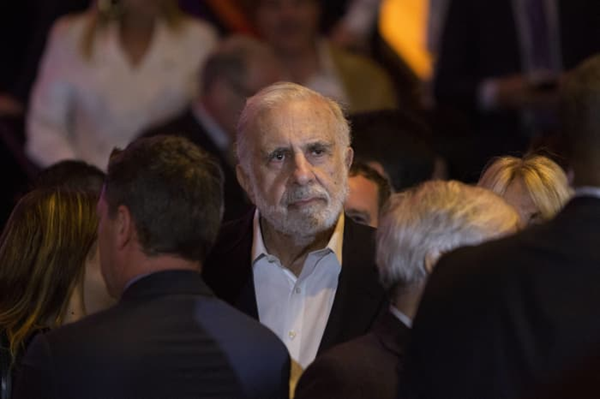The Celebrity Activist Investor Is Going Extinct
Turns out you don’t need a tough activist reputation to spur
change at companies anymore
By
Lauren Thomas
Dec. 26, 2024 9:00 pm ET
|

Illustration: Rachel
Mendelson/WSJ, iStock (2)
|
An era of big-name activists with fiery personalities waging noisy
proxy battles and wielding brash tactics to win board seats is over.
Carl Icahn, facing
attacks on how he manages his
own publicly traded firm, has slowed his fire. Nelson Peltz, fresh off
losing a battle with Disney,
is planning to
hand his firm to his less
pugnacious son and others. Bill Ackman and Jeff Ubben have
walked away from fights. Dan
Loeb hasn’t had a big proxy war in years.
In their stead is a newer crop of activists who are smaller in size,
less well known and often less eager to brawl.
The activist shift is coupled with changes on the corporate side.
After years of activists hammering the same points over and over, many
boards are more alert. They are moving faster in cases of
underperformance, firing CEOs, striking deals and more willing to
embrace activists who do come along.
The results: The number of proxy fights that go all the way to a vote
is down. Settlements with companies are up, and coming faster than
ever. And the returns of the activist funds are generally
underperforming.
With the proverbial low-hanging fruit picked, and fundraising
difficult, it is unlikely a new activist giant will emerge to strike
fear each time it appears in a shareholder roster.
|

Nelson
Peltz, of Trian Fund Management, sees himself as a
‘constructivist.’ Photo: Marco
Bello/Bloomberg News
|
“The industry in most cases is becoming much more institutionalized,”
said Charlie Penner, a longtime activist investor who launched a new
firm with a name purposefully meant to sound anonymous: Ananym. “It’s
not as personality-driven anymore.”
For the past two years, nearly two-thirds
of agreements between companies and activists have been struck
privately, according to an analysis by FTI
Consulting. Even when things
get heated, they are cooling quickly. It took only an average 34 days
for an investor to get a settlement after publicly demanding board
seats in 2024, down from 68 days in 2023, FTI found.
Take some of the settlements that happened
in recent months with investors: CVS
Health quickly
settled with Glenview Capital
Management, which isn’t typically an activist.
Ancora Holdings took on Norfolk
Southern in a
proxy fight earlier this
year—winning three board seats—and later struck a settlement deal to
expand the board and avert a second proxy battle at the railroad
operator. Engaged Capital struck
an agreement last year with
burger chain Shake
Shack. Sachem Head Capital
Management landed a spot on communication-technology firm Twilio’s
board in April. Anson Funds recently snagged a seat on the board of
cloud-software provider Five9.
Penner was at Engine No. 1 when that
little-known firm successfully
challenged the board of Exxon
Mobil and he previously worked
at Jana Partners. He launched Ananym Capital Management this year with
Alex Silver, formerly of another firm, P2.
An “ananym” is a pseudonym made by
spelling one’s name in reverse. Penner said they chose it in part to
underscore today’s dynamics. They recently found a first target:
pushing Henry
Schein, a healthcare products
distributor, to change its board.
“It shouldn’t be about ego or whatever,” Penner said. “It should be
about having good ideas and a good process.”
|

CVS
Health conducted a strategic review and quickly settled with
Larry Robbins’s Glenview Capital Management. Photo: Amir
Hamja for WSJ
|
From ‘corporate raiders’ to ‘constructivists’
Shareholder activism traces its roots back to the 1980s, when
investors started to buy up stakes in companies and agitate for
changes ranging from management shake-ups to strategic breakups. Into
the 1990s, the investors were commonly referred to as “corporate
raiders.”
In the last few decades, they have worked
to shed their negative stigma. Peltz, founding partner of Trian Fund
Management, has waged some of the biggest proxy fights ever, including
at Procter
& Gamble in
2017 and Disney
in 2023. He is also among those
labeling themselves as “constructivists,” for being helpful rather
than antagonistic.
They
pitch complex plans for turnarounds and corporate shifts, not only
financial moves aimed to juice the stock immediately. By proving they
do their homework, firms like Elliott Investment Management, Starboard
Value and Jana have won more allies.
But companies and their defenders still scoff at the constructivist
idea and believe activists themselves can be disruptive.
That is one reason activists propose allies for boards. Fifteen or 20
years ago, the big-name fund managers would mostly nominate themselves
for board seats, said Amy Lissauer, global head of activism- and
raid-defense at Bank of America.
“Activists now are identifying great independent candidates…the
highest quality I have seen,” Lissauer said.
Companies play defense first
Company attitudes have also helped reduce big activist brawls.
Management teams are now more cognizant about the possible threat and
are working to stay ahead of it by swapping directors and executives
and pursuing deals.
In 2024, a number of companies including Boeing, Under
Armour and Intel have ousted
their CEOs without the known
presence of an activist.
“There were many sleepy C-suites and passive boardrooms, and it took
an activist waging a public campaign to shift the mindset,” in years
past, said Mary Ann Deignan, head of Capital Markets Advisory at
Lazard, where she helps defend companies against activist attacks.
CVS this fall ousted its chief executive
and concluded a
strategic review, then struck a
deal to add Glenview founder Larry Robbins to its board of directors.
Robbins had only twice in 24 prior years used an activist playbook.
It is also true that many companies have
grown more fearful of losing because of a recent change
in the proxy voting procedures,
leading them to accept the activists quickly.
The pressure for returns
Many of the new-age activists worked for the first generation. Now
they need to raise money on their own reputations, which has proven
difficult.
Activist hedge funds as a group saw net outflows in four out of the
last six years, though are seeing a slight bump in 2024, according to
HFR, a hedge-fund data tracker.
Activist-focused hedge funds also generally
tend to underperform the broader market.
Through early December of this year, activists were up 6.4% versus the
S&P 500’s rise of over 30%, according to HFR.
“It’s becoming increasingly harder for activists to raise money,” said
Michael Levin, founder of consulting firm the Activist Investor. As a
result, some firms realize “it doesn’t pay to be quite as distinctive
or outspoken.”
There remain exceptions and big fighters, including Elliott and
Icahn.
|

Carl
Icahn remains an activist investor. Photo: Victor
J. Blue/Bloomberg News
|
But Icahn had his own Icahn
Enterprises hit by short-seller
accusations that he was
overvaluing some positions. Icahn has denied the claims, but has
dialed back his activity.
Peltz has seen his firm’s assets under
management shrink and is preparing to step back himself, handing
over more responsibility to a
younger generation of leaders, including his son, Matt Peltz, as well
as Josh Frank and Brian Baldwin. Some wonder whether Trian will
continue launching high-profile activism campaigns when the elder
Peltz is no longer at the helm.
(Baldwin landed a seat on U.K.-based Rentokil
Initial’s board in October,
shortly after Trian disclosed
a position in the pest-control
maker.)
More may go the way of Ackman, once one of the biggest activist
managers. After a series of losses, he decided to be less vocal and
more friendly about investments.
“It makes our job easier and more fun, and
our quality of life better,” Ackman penned in his annual
letter to Pershing Square
investors in 2021. “So, if it is helpful to call this quieter approach
Pershing Square 3.0, let it hereby be so anointed.”
Write to Lauren Thomas at lauren.thomas@wsj.com
Appeared in the December 27, 2024, print edition as 'Era of Turbulent
Proxy Battles With Big-Name Activists Ends'.